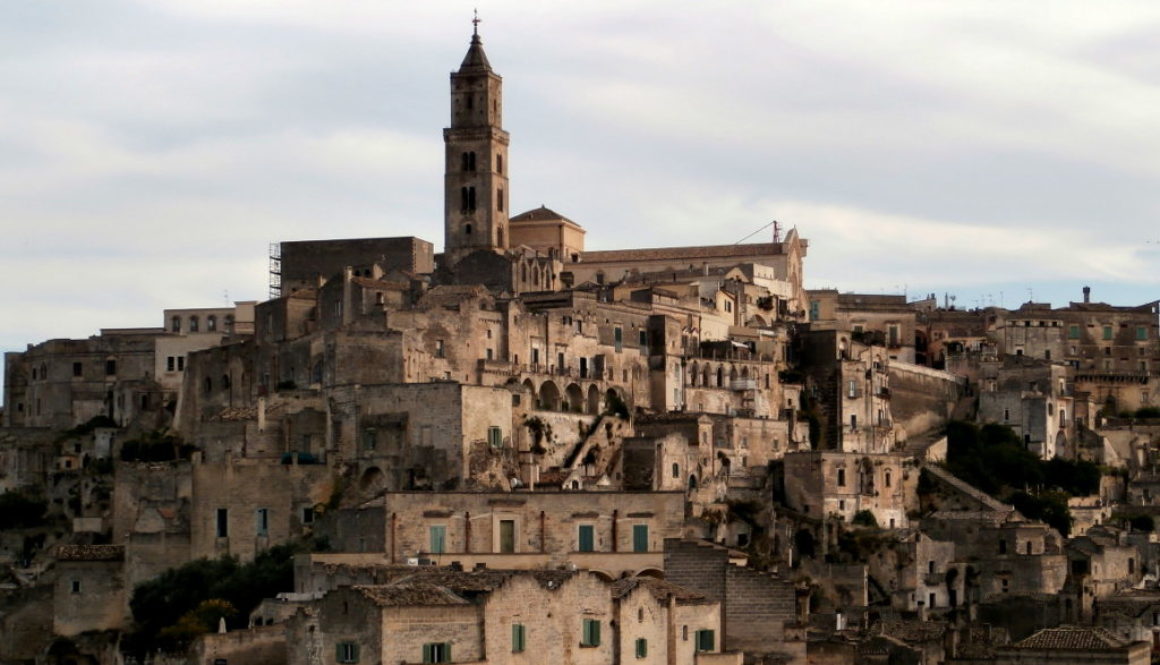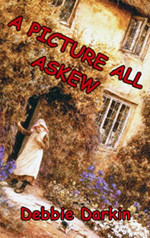MATERA
Getting Around: A BUGGY RIDE – WITH A SEXY YOUNG GUIDE
23rd September.
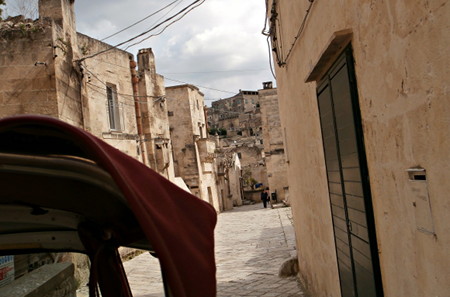
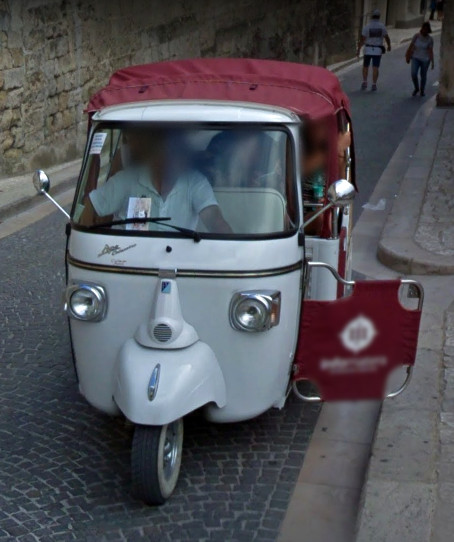
If like Lolly and me you get short of breath easily, then an Apé taxi for getting around Matera is a great solution. Of course, after the clear up and because it was already very hot for visiting Matera, a thirty-minute drive away from our base we rang up and booked one of the three seater, three-wheeled buggies, all brightly painted, that drive you all around the Sassi and a little of the modern city, seated in shade under a colourful canopy.
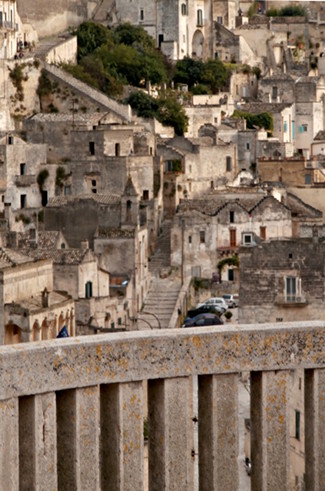
Our guide, Andrea, was young, with a mop of fuzzy hair sitting atop his head. A pretty enough face, despite being dominated by glasses with the fashionable thick black frames – but that lad had the sexiest mouth since Al Pacino. I hope he didn’t notice this old crone staring, fascinated, when he turned his head to give us interesting and colourful information about our surroundings: He took us to the area where his grandparents had lived – and pointed out the very Troglodyte dwelling. This made the tour extra interesting to us. We were happy to learn that all the guides and many of the small business owners in the Sassi are descendants of the people who were cleared from the area in 1952.
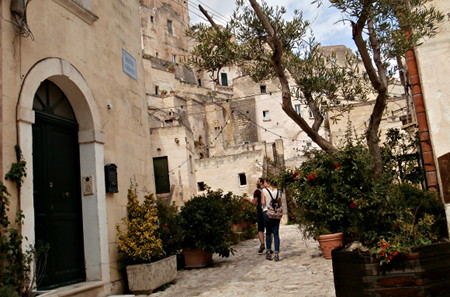
WE ENTER MINAS TIRITH
The Sassi is the Citta Istorica of Matera – a complete city formed from caves in one side of a gorge. Getting around can be difficult if you are prone to breathlessness, or not so energetic, but it’s worth trying. It is very beautiful; tiers of apricot-tinted white stone houses and churches rising one above the other (the roads pass over the top of the dwellings beneath them). If you’ve ever read ‘The Lord of The Rings’ this is our idea of Minas Tirith.
‘THE SHAME OF ITALY’
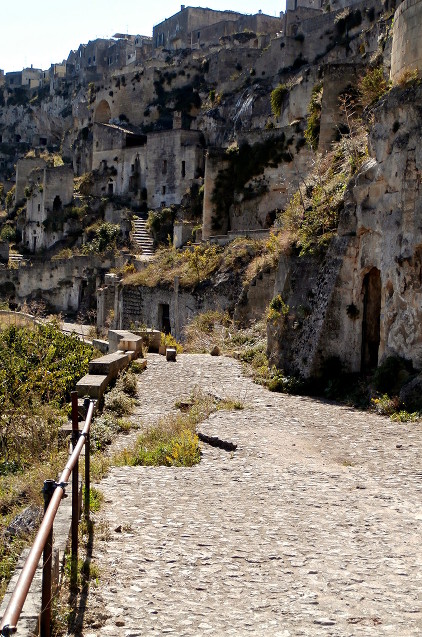
Matera has been occupied continuously for 9,000 years! (Though the Sassi were completely ‘cleared’ in 1952, mostly because Carlo Levi’s book ‘Christ Stopped at Eboli’ declared them ‘The Shame of Italy’. Over 60,000 people were moved out over two years. They were offered the cost of passage to America or Australia if they did not wish to settle in the low blocks of flats specially constructed as a separate ‘neighbourhood’ in a leafy suburb of the ‘New’ Town.)
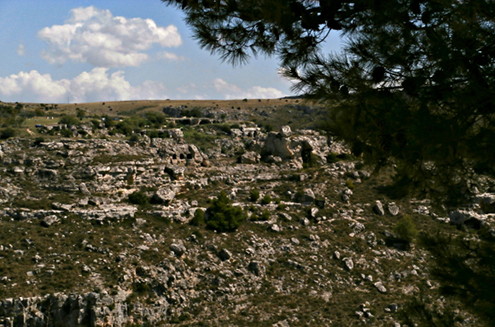
It appeared that at that time virtually nobody outside of the immediate district was aware of the Sassi – not even most Italians. I guess it was regarded as a slum, and perhaps local people in the area avoided the inhabitants of this unknown place, however groundless their fears. The people of the Sassi were a ‘closed community’.
You look over to the other side of the Gravina Gorge to see the prehistoric caves, and some very, very old cave churches, with wonderful murals. I have only seen photographs – no way could I venture over the cable-bridge, or even tackle all the rough steps down to it. (In a later post Graham will take you across.)
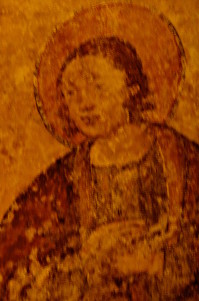
GO SOON – BEFORE IT CHANGES
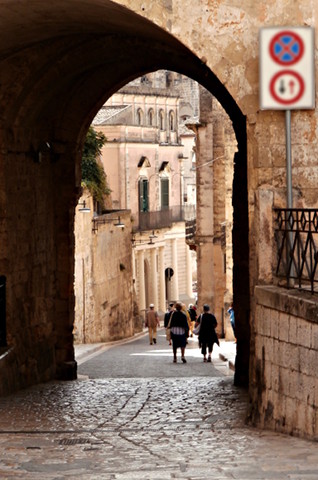
Nowadays it is rapidly getting ‘cleaned up’, and there are many ‘holiday ‘lets’’ in erstwhile poor cave dwellings: and the pale apricot stone exteriors are enlivened now with tubs of bright flowers, and cats laze on the flat roofs wherever they do not serve as roads for the dwellings above them. Since we first visited in 2009 there are more cafés and restaurants, though apart from one or two at the top, I could still see only the one grand hotel on the main road in. So far, all the development is discreet; tasteful and in keeping – and the guides all appear to be descended from the original inhabitants. One end of the Sassi has been left untouched as a memorial and a future museum.
LITTLE BOUTIQUES AND STUDIOS
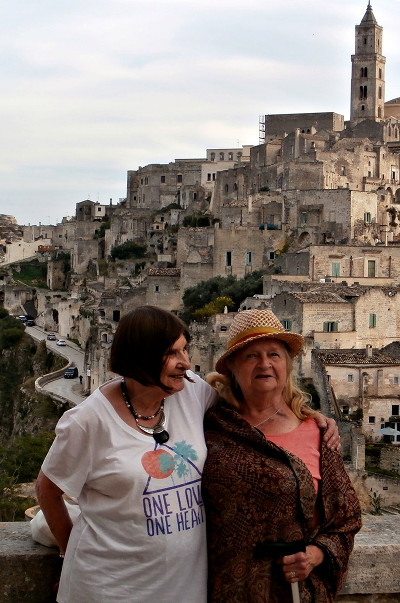
Saying goodbye to the delightful Andrea we decided to indulge Lolly by a stroll down the streets of little shops at the top of the Sassi. These sell fashionable clothes and accessories of good quality, and a number of real art studios can be found amongst the souvenir shops.
I called Graham over to look in the window of a small sculpture studio. He took a cursory glance and said ‘The usual wizards and elves and fairies’.
‘Yes – but better than usual; look at the faces. Anyway, those weren’t what caught my eye. Look at these’ – and I pointed instead to a simply wrought terra-cotta group of three musicians. They were masterly in the amount of detail as to their instruments, and the expressions not only in their faces, but their whole bodies had been conveyed in the most sparing way. They were clearly the work of a master of his craft.
We went in, and the young man at the desk said – no, the terra-cottas were not his work – but the Lord of the Rings figures were. We admired the artistry in the lovely colours, but I said ‘I really love the terra-cotta figures; they seem so real’.
‘They are of real people,’ he said; ‘They are the work of my father.’
‘I just love them,’ I said.
‘I could buy you one for your birthday present,’ said Graham. ‘You haven’t chosen anything yet’. But the figures were 150 Euros each, and you really needed the three as a group.
Then I spotted it; the patient Matera donkey bearing the peasant man and wife on its back; she with a bundle of twigs tied about her waist, he with a bottle sticking out of his saddlebag.
They were so lifelike, and spoke volumes of the simple life and hard toil which was their lot. But the sculpture cost 200 Euros. Well worth it, but it would make too much of a hole in our holiday money. We reluctantly said we would have to think about it.
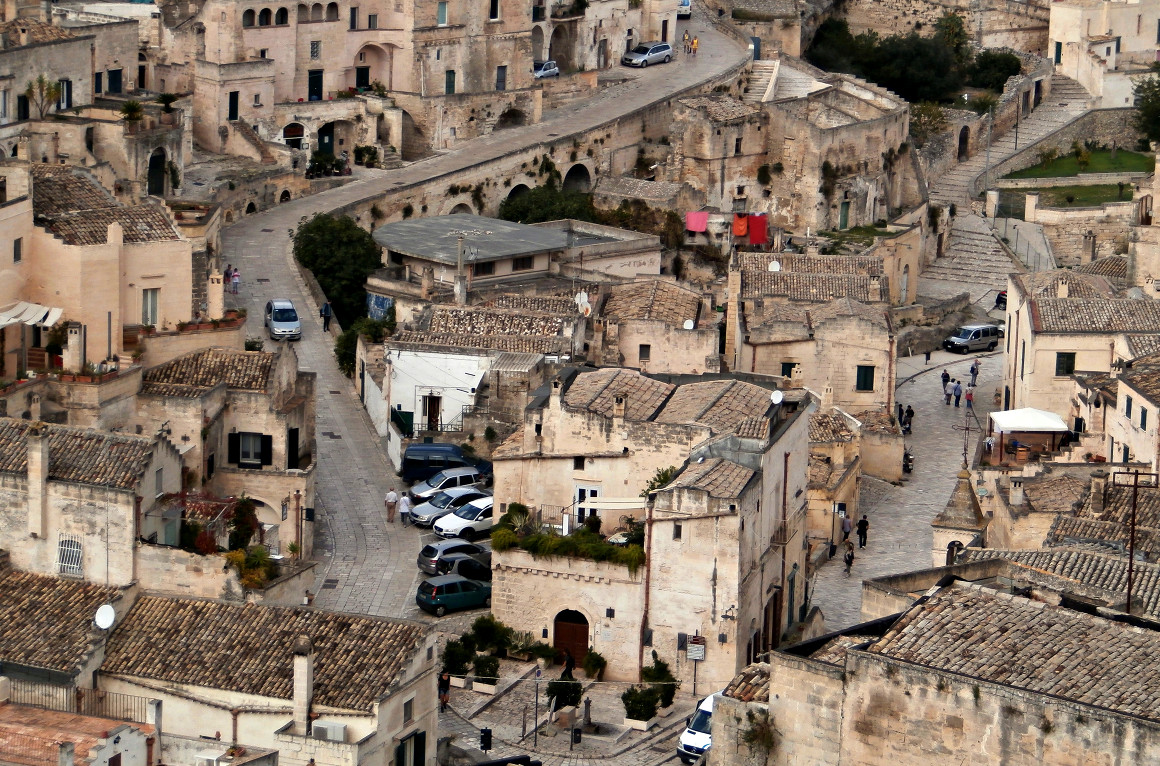
MONTESCAGLIOSO: BEAUTY – OLD AND NEW
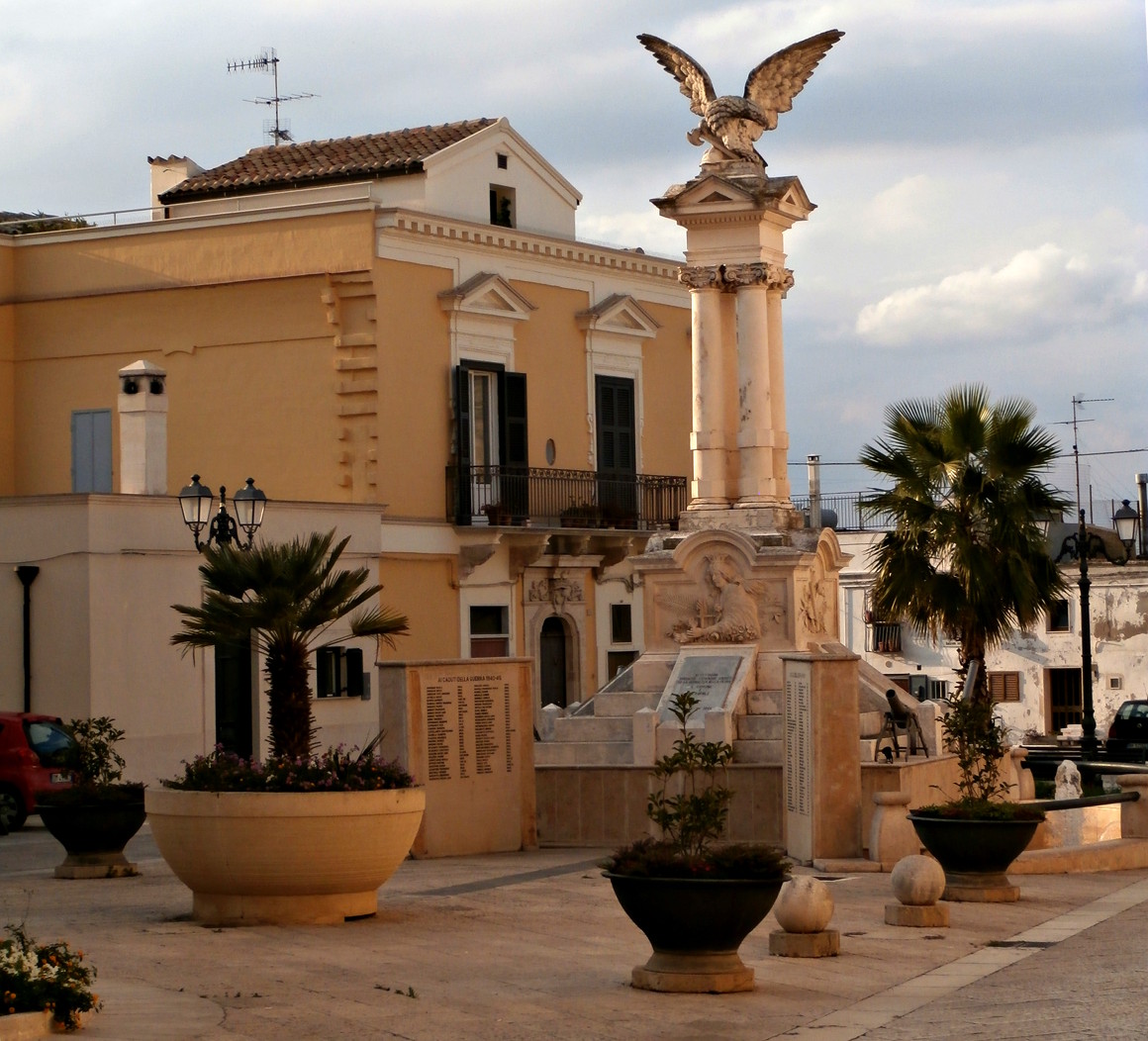
After leaving the sculpture studio we took the advice of the chef of Ristorante 900 and drove the short distance to Montescaglioso, a largish walled town, mostly up on a high hill, and topped by a very old abbey.
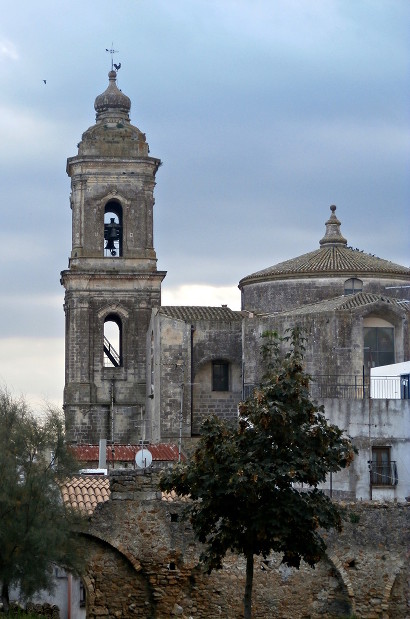
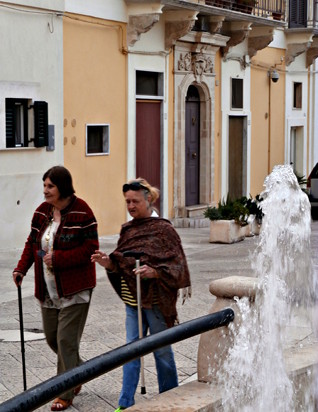
Unfortunately, apart from an exhibition in the large gatehouse, you cannot inspect the building from inside. However, passing through an archway you find an extremely elegant piazza with an impressive fountain in the centre – a monument to the fallen from the place, sacrificed in both World Wars. (Everywhere we went in Italy, we saw impressive tributes to their dead heroes, even in the poorest towns.)
While Graham went off along the path alongside the city wall, photographing the panoramic views to be seen from that height, Lolly and I rested on a bench in the same pink-tinged white stone that surrounded us. Later, restored and in full-on mode, my gregarious friend chatted up five very young men to pose for photos with us. They could all have been film stars, and there they are, caught for posterity, their white teeth flashing above us two great-grandmothers!
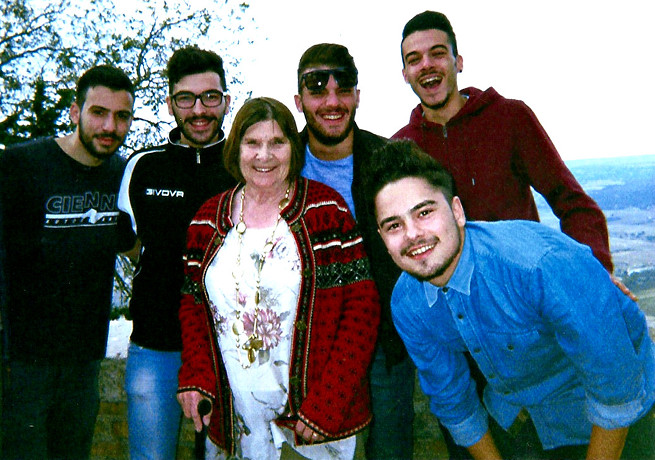
Text by – Jackie Usher, SWWJ. (aka author Debbie Darkin, & ‘Graham Liverpool’ on Trip Advisor.)
Photographs by – Graham Usher.
![]()

